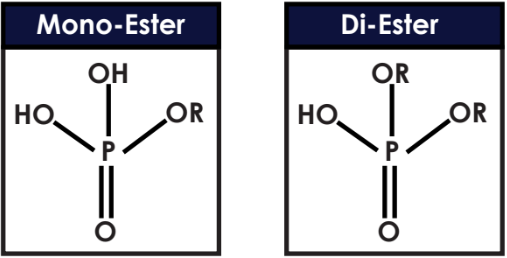Knowde Enhanced TDS
Identification & Functionality
- Cleaning Ingredients Functions
- Industrial Additives Functions
- Product Families
- Chemical Structure of Phosphate Esters

Features & Benefits
- Labeling Claims
- Industrial Additives Features
- General Properties of Phosphate Esters
- Alkali Stability and Solubility
- Coupling and Emulsification
- Detergency and Rinse-ability
- Increased Hard Water Tolerance
- Corrosion Inhibition
- Lubricity
- Wetting
- Thermal Stability
- Background on Phosphate Esters
- Phosphate Esters are anionic surface active agents produced by reacting polyphosphoric acid or phosphorous pentoxide with molecules containing hydroxyl groups - commonly ethoxylated moieties or alcohols. Reactions using phosphorous pentoxide result in a mix of mono and di-esters, while products made with polyphosphoric acid are high in mono-ester yield.
- Which type to use depends upon the properties needed in formulation. Mixed esters products are generally better for emulsification; whereas, mono- ester rich exhibit better hydrotroping properties.
Applications & Uses
- Markets
- Applications
- Home Care Applications
- I&I Cleaning Applications
- Industrial Additives End Use
Properties
- Physical Form
- Appearance
- Pale yellow liquid
- Soluble in
- Ethanol.
- Compatible with
- Anionic Surfactant, Nonionic Surfactant
- Insoluble in
- Mineral oil, Kerosene, Perchloroethylene
- Typical Properties
- Compatibility
This product should not be mixed with concentrated oxidizing agents or reducing agents, as the mixture of these compounds with organic compounds form a potentially explosive mixture.
| Value | Units | Test Method / Conditions | |
| Caustic Solubility (in 18% NaOH at 25°C) | 19.5 | - | - |
| Activity | 80.0 | % | - |
| Color | max. 5 | Gardener | |
| Flash Point | min. 200 | °F | PMCC |
| Moisture Content | 18 - 20 | % | - |
| pH (at 1% aqueous Solution) | 2 - 3 | - | - |
| Pour Point | 25.0 | °F | - |
| Acid Value (at pH 5.5 - 9.5) | 156 - 300 | mg KOH/g | - |
| Specific Gravity (at 68°F) | 1.19 | - | - |
| Weight (at 68°F) | 9.9 | lbs/gal | - |
| Surface Tension (0.05% aqueous at 77°F) | 33.4 | dynes/cm | - |
| Cloud Point (at 15% in NaOH aq) | min. 75 | °F | - |
Regulatory & Compliance
- Certifications & Compliance
Storage & Handling
- Storage & Handling Information
- T-Mulz 844 is regarded as non-hazardous but is acidic and should be handled as such.
- It is considered to possess low acute oral and skin penetration toxicity.
- It should not be used in products for internal use.



